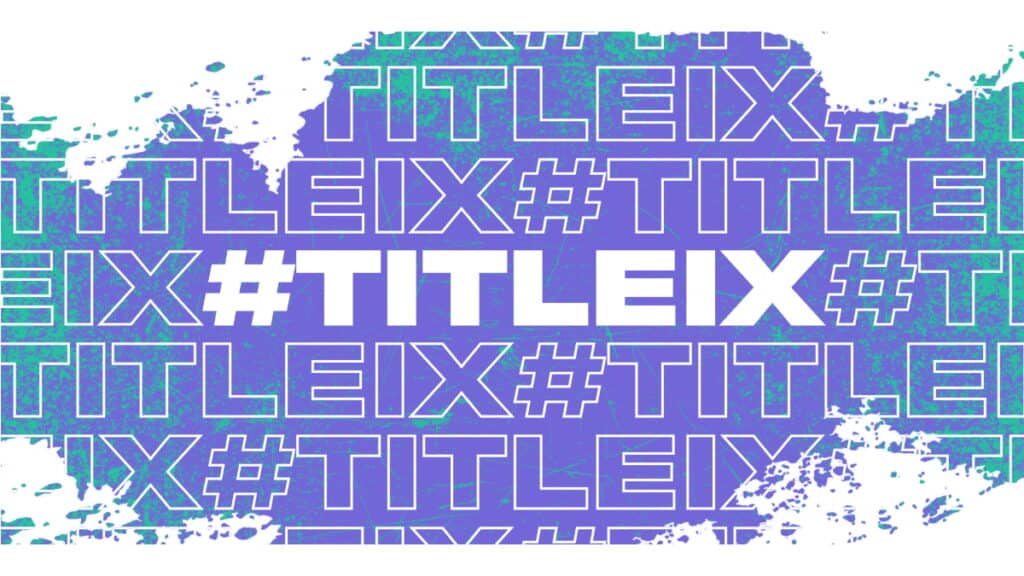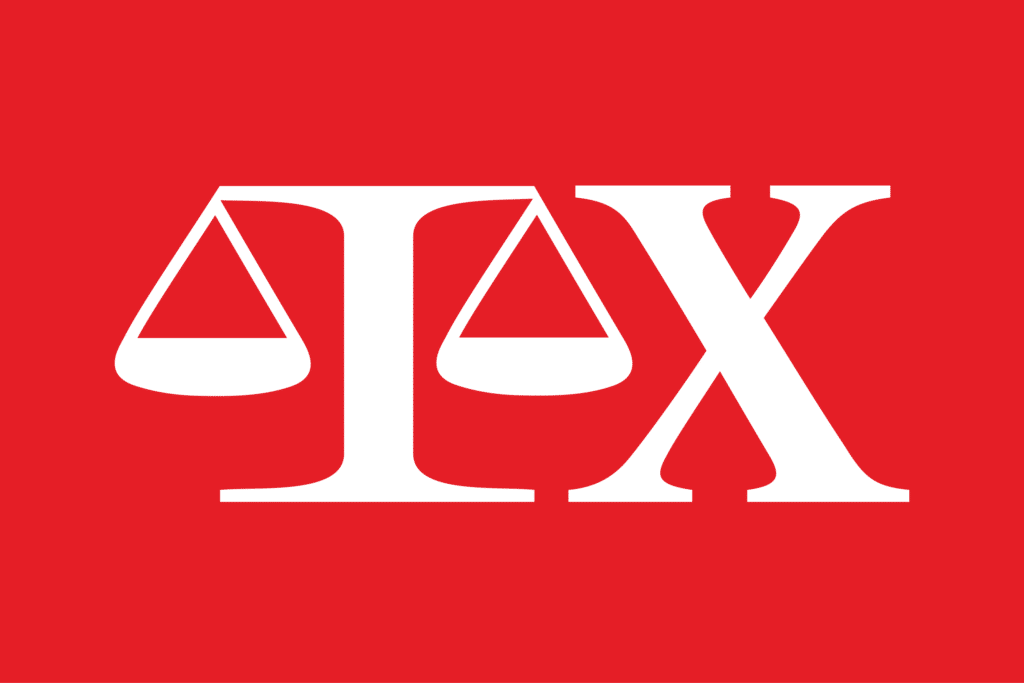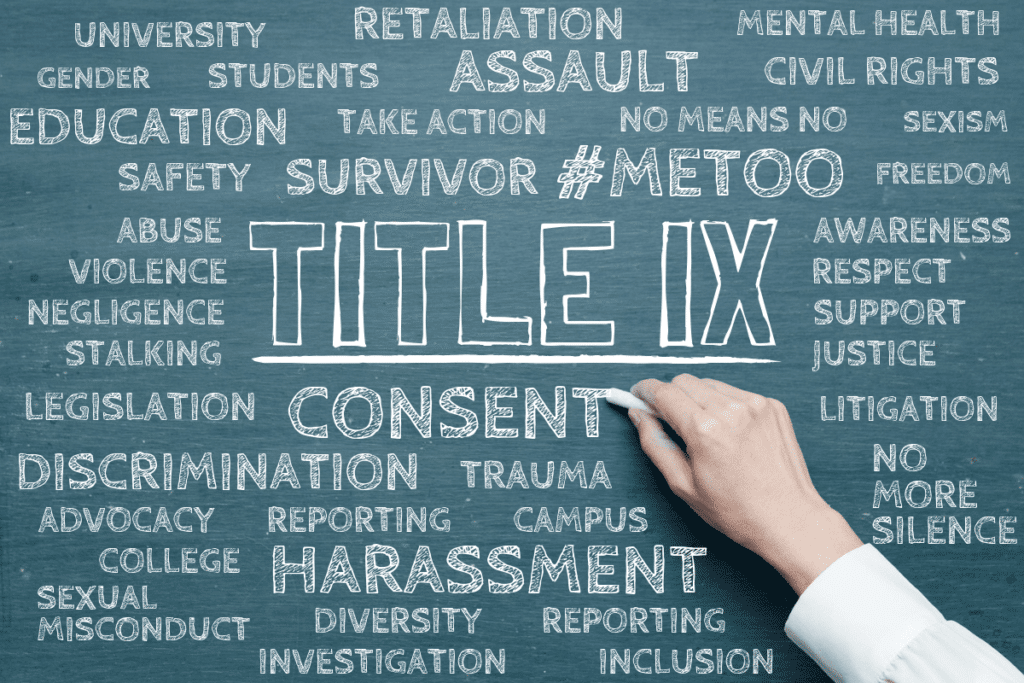When people refer to “Title IX,” they are referring to the provisions of Title IX within the Education Amendments of 1972 (20 U.S.C. §§ 1681 et seq.).
The purpose of these provisions is the prevention of gender-based discrimination, all forms of sexual harassment, and unlawful retaliation. The provisions of Title IX apply to transgender individuals as well as those who identify as their birth sex.
The basic purpose – and scope – of Title IX is summed up fairly well with the following words in the legislation itself:
“… No person in the United States shall, on the basis of sex, be excluded from participation in, be denied the benefits of, or be subjected to discrimination under any education program receiving Federal financial assistance…”
Since its creation, Title IX has resulted in many complaints and lawsuits deriving from gender-based discrimination, sexual harassment, and retaliation against complainants and litigants. As we will discuss, the most well-known context associated with Title IX is sports and athletics, but Title IX applies in other contexts too. Issues involving gender – especially those having to do with transgenderism – continue to be widely discussed and prominent throughout Maine and the rest of the country, and so we will likely see many more complaints in the future.
As criminal defense experts, the lawyers at the Maine Criminal Defense Group are very familiar with the provisions, procedures and concepts of Title IX; we can provide expert consultation on the most probable outcome of a given case, give feedback, and deliver stellar defense whenever necessary. If you’ve been charged with a violation of Title IX, don’t hesitate to contact us immediately if you need expert assistance.
In this post, we’re going to discuss Title IX by answering the top 9 “frequently asked questions” about this important federal provision. Let’s go through these questions, one by one.
Call 207-571-8146 or contact us online to schedule a consult with one of our highly skilled criminal defense & OUI lawyers, serving Southern Maine, today.
Table of Contents
Does Title IX Apply to All Educational Institutions in the United States?
No, Title IX doesn’t apply to all educational institutions in the United States, only those institutions which receive federal financial assistance. Hence, if an institution doesn’t receive federal funding, it won’t come under the purview of Title IX. Importantly, Title IX applies to both public and private educational institutions, as long as those institutions receive federal funding. Private universities, therefore, cannot claim to be outside the reach of Title merely because of their status as private institutions; if they receive federal financial aid, Title IX applies.
In addition to public and private colleges and universities, Title IX also extends to a variety of other institutions, including local school districts, for-profit schools, charter schools, museums, libraries, and other institutions which have educational programs. Again, the common denominator is the receipt of federal funds. So, if a private museum accepts federal financial aid to fund an educational exhibit, that private museum comes under the purview of Title IX. If a public or private institution doesn’t receive federal funding, then it wouldn’t come under Title IX. For the purposes of Title IX’s applicability, anytime a student receives federal financial aid, this would bring the receiving institution under the rulership of Title IX. Institutions don’t have to receive financial assistance “directly” from the federal government to fall under Title IX; federal aid in the form of federally-backed student loans is sufficient to trigger the application of Title IX.
Does Title IX Only Protect Against Harassment from Teachers?
No, Title IX doesn’t only protect against sexual harassment from teachers and educators, but also applies to other students, school employees and administrators, and also campus guests. Campus guests include people such as outside speakers who appear at an institution temporarily to deliver a speech or make a presentation. If one of these individuals commits a violation, then there may be repercussions under Title IX. Importantly, Title IX also covers any sort of discrimination on the basis of parental status, and so if a student is also a mother or father, that student cannot suffer harassment on that basis.
What are the Most Basic Elements of Compliance with Title IX?
To be superficially in compliance with Title IX, institutions should have the following three items in place at all times: (1) there must be an established procedure for handling complaints of sex or gender-based discrimination, (2) the institution must distribute information on Title IX’s anti-discrimination policy, and also its procedure for handling complaints, to students and faculty in the form of a written pamphlet or other type of document, and (3) the institution must have an official “Title IX coordinator.”
Call 207-571-8146 or contact us online to schedule a consult with one of our highly skilled criminal defense & OUI lawyers, serving Southern Maine, today.
Does Title IX Only Apply to Athletic or Sporting Contexts?
No, although many prominent Title IX discrimination cases have involved sports or athletics, these are not the only contexts in which Title IX applies. Title IX applies to all manifestations of gender-based discrimination, sexual harassment, and retaliation, regardless of the context of these manifestations. One of the most common types of Title IX violations is a complaint against a sports coach because of gender discrimination. But, it’s also common to see instances of bullying, employment discrimination, pregnancy discrimination, parenthood status discrimination, advancement discrimination, and so forth. These other instances show up in a wide range of contexts, not only those associated with athletics or sports. If a female student is turned down for an internship opportunity in a science or technology field, and this happened only because of the student’s gender, then this would be a clear violation of Title IX.
What are the Most Common Forms of Discrimination Which Occur?
Many forms of gender discrimination occur on a given college or university campus during a given period of time. Here are a few examples of discrimination which are known to be fairly common:
- sexual harassment in the form of cat calls, unwanted advances, or unwelcome touching from an employee, teacher or administrator,
- gender-based bullying in the form of derogatory comments made toward a LGBTQ individual on campus,
- lack of employment advancement on the basis of pregnancy,
- lack of employment advancement in science or technology on the basis of gender,
- inequitable athletic policies which give preference to a certain gender or sexual identity, and others as well.
How Does Title IX Retaliation Most Commonly Manifest?
One of Title IX’s most critical provisions pertains to retaliation against students or others who launch complaints against violators. These provisions are very important because they bring a much-needed additional layer of protection and security for students and others protected by Title IX. In many cases, detecting instances of retaliation can be tricky because perpetrators frequently attempt to hide, disguise or otherwise obscure their own retaliatory efforts. Nevertheless, a few of the most common examples of retaliation against complainants include the following:
- giving out poor grades without a legitimate scholastic reason,
- overlooking a student for an athletic team without sufficient reason,
- reduced playing time, or demotion in playing status, without an adequate reason,
- suspension or expulsion without reason, and
- harassment or bullying against a complainant.
Again, identifying these instances can be difficult because very often the efforts of the perpetrator are deliberately obscured. This is why charges of retaliation often need a substantial bit of concrete evidence. Another important point to make is that, in addition to students, teachers and administrators are likewise protected from retaliation. If, for instance, a teacher makes a complaint regarding an unfair school policy or incident, that teacher cannot be retaliated against by another teacher or by other members of the administration.
Learn More → Title IX False Accusation in Maine
Call 207-571-8146 or contact us online to schedule a consult with one of our highly skilled criminal defense & OUI lawyers, serving Southern Maine, today.
Does Title IX Apply to Transgender Individuals & Sexual Orientation?
Yes, although many Title IX cases involve sexual harassment among heterosexual individuals, and non-transgender discrimination, the provisions of Title IX definitely apply to those who identify as transgender, or homosexual, or another member of the LGTBQ community. As LGTBQ issues have gained attention throughout the country, Title IX cases involving individuals from that community have increased in tandem. Any form of bullying, harassment, denial of advancement, or other discrimination against someone with a nonconforming gender identity is absolutely prohibited under Title IX and can be punished accordingly. The provisions of Title IX which apply to these cases were addressed specifically by President Obama.
How Does Title IX Apply to Incidents Which Occur Off Campus?
If Title IX applies to a particular educational institution, then the provisions of Title IX will cover all incidents which derive from any program sponsored by that institution, regardless of the location of the incident. So, for instance, if an athletic program or other extracurricular activity takes place off campus, and an incident occurs, that incident can still be considered an offense under Title IX and may carry a punishment. The only requirement is that the perpetrator must be a student, teacher or other employee of the institution. This is a key fact which readers should carefully process. The provisions of Title IX follow the educational institution, not the particular location of an incident; so, if a teacher harasses a student off campus, that teacher can almost certainly be brought up on charges under Title IX, despite the fact that the harassment didn’t occur on school grounds.
Call 207-571-8146 or contact us online to schedule a consult with one of our highly skilled criminal defense & OUI lawyers, serving Southern Maine, today.
Does Title IX Apply to Incidents of Sexual Violence?
The primary purpose of Title IX is to protect against gender-based discrimination, and sexual harassment, but Title IX also has provisions which apply to sexual violence too. In fact, educational institutions under the purview of Title IX need to take steps to ensure that they are actively preventing sexual violence (i.e. sexual assault) and have systems in place to handle sexual violence allegations. The Department of Education has even issued guidelines for educational institutions so that they are fully compliant with Title IX’s provisions on sexual violence. Moreover, even when an incident leads to a civil suit under Title IX, this doesn’t preclude an additional criminal charge for the same underlying offense.
Contact the Maine Criminal Defense Group for More Information
This is certainly a whole lot of information to absorb. Title IX is undoubtedly a central piece of legislation for educational institutions, and all other institutions which fall under Title IX’s purview. Although this legislation is most commonly associated with the pursuit of equity and fairness in athletics, its provisions are broadly applicable to a wide range of phenomena, including general sexual harassment, discrimination based on sexual identity, discrimination based on sexual orientation, and so forth. In point of fact, this legislation will only continue to gain importance as society focuses more and more on gender related issues, such as transgenderism, gender politics, and so on. Educational institutions need to ensure that they have the resources and tools in place to remain in full compliance with Title IX at all times.
If you’re a teacher, employee or administrator and you need counsel on Title IX compliance, or you need assistance with a current complaint or charge, the attorneys at the Maine Criminal Defense Group can give help today. Call us at 207-571-8146 and one of our experts can provide assistance right away.
Call 207-571-8146 or contact us online to schedule a consult with one of our highly skilled criminal defense & OUI lawyers, serving Southern Maine, today.
Blog Posts

When most people think of “Title IX” they tend to focus on the role on Title IX in preventing sexual or gender-based discrimination on college and university campuses. Title IX[...]

Being accused of sexual misconduct in an educational environment in Maine can have serious ramifications for your future. As such, any accusation must be treated seriously. Even if you are[...]

For a law passed in 1972, Title IX has been in the news a lot in recent years. As sexual assault and other sex crimes have gained more attention in[...]

Maine’s schools have a duty not only to educate our youth, but to provide a safe environment for them to study and learn in. All children are entitled to certain[...]

A slew of allegations, including claims of domestic violence assault, has become even more complex because they happened in college, where federal laws provide for an independent system to decide[...]


